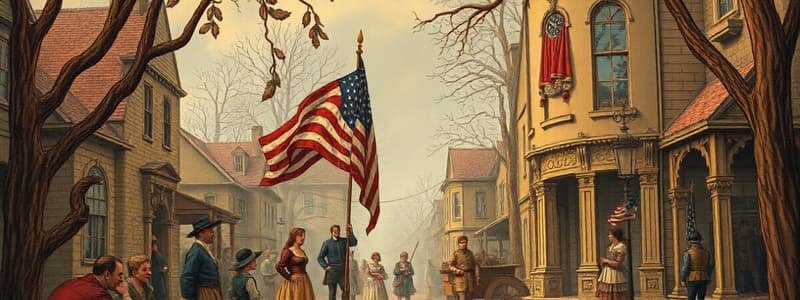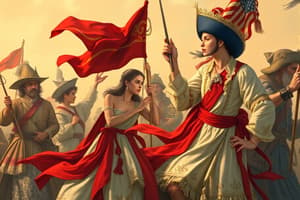Podcast
Questions and Answers
What was the primary reason for the Boston Tea Party?
What was the primary reason for the Boston Tea Party?
- Tax exemptions on tea
- Smuggling tea
- Anger over British taxation (correct)
- Support for the British East India Company
The American Revolution and the American War for Independence are the same events.
The American Revolution and the American War for Independence are the same events.
False (B)
What did the Stamp Act of 1765 require?
What did the Stamp Act of 1765 require?
All printed material had to carry a paid stamp.
The __________ Act forced colonists to house British soldiers in their homes.
The __________ Act forced colonists to house British soldiers in their homes.
Match the following acts with their descriptions:
Match the following acts with their descriptions:
Which document suggested that Americans were loyal British subjects?
Which document suggested that Americans were loyal British subjects?
Thomas Paine's Common Sense advocated for reconciliation with Britain.
Thomas Paine's Common Sense advocated for reconciliation with Britain.
What was the purpose of the First Continental Congress?
What was the purpose of the First Continental Congress?
The __________ Acts curtailed self-government in Massachusetts.
The __________ Acts curtailed self-government in Massachusetts.
What was a primary consequence of the Declaratory Act?
What was a primary consequence of the Declaratory Act?
Flashcards are hidden until you start studying
Study Notes
The American Revolution and War for Independence
- The American Revolution and the American War for Independence are not the same thing.
- The American Revolution was not about taxes.
- The Boston Tea Party was about taxes and smuggling.
British Actions and Colonial Response
- The Seven Years' War ended with the Treaty of Paris in 1763, which left the colonies with war debt.
- To pay for the war, Britain raised taxes on the colonies.
- The Sugar Act of 1764 extended the Molasses Act, lowered the tax on imports, but started enforcing it by stamping out smuggling.
- The Stamp Act of 1765 declared all printed material had to carry a paid stamp, which angered colonists.
- The Townshend Acts of 1767 created a new board of customs to stop smuggling.
Colonial Resistance
- Colonists responded to the Stamp Act with a boycott of British goods.
- The colonists felt they had no say in how the British government taxed them.
- The Stamp Act Congress organized the first major coordinated action by the colonies.
- Committees of Correspondence, which had been created to encourage opposition to earlier acts, now grew to coordinate the boycott efforts.
- The Sons of Liberty organized street actions.
- British Parliament repealed the Stamp Act.
- The Declaratory Act claimed that Britain could tax the colonies whenever they wanted.
The Boston Tea Party
- The Tea Act of 1773 offered tax exemptions and rebates for tea coming in from the British East India Company, which lowered the price of tea.
- Colonists were upset because allowing the British to tax a near universal product set a precedent for future taxes.
- The colonists reacted with the Boston Tea Party.
- The British responded with the Intolerable Acts.
The Start of the Revolution
- The Intolerable Acts curtailed self-government in Massachusetts.
- The Quartering Act forced colonists to house British soldiers in their homes.
- The Quebec Act extended the southern boundary of Quebec and granted religious toleration to Catholics.
- The First Continental Congress met in Philadelphia in 1774 to coordinate resistance to the Intolerable Acts.
- The First Continental Congress was the first real colony-wide government in British America.
Thomas Paine and Common Sense
- In 1775, the Continental Congress sent the Olive Branch Petition to King George III suggesting that Americans were loyal British subjects.
- Thomas Paine's Common Sense advocated for independence in 1776.
- The publication of Common Sense contributed to the idea that America is exceptional.
The American War for Independence and Other Factors
- The war between colonists and Britain began in 1775.
- The colonists actually lost the Battle of Bunker Hill, but the British suffered heavy casualties.
- Not all colonists were pro-independence, especially elites in colonies like New York and Pennsylvania.
- In July of 1776, the Second Continental Congress declared independence.
The American Revolution and War for Independence
- The American Revolution and the American War for Independence are separate but linked.
- The Revolution was about self-governance and independence from British rule.
- The Boston Tea Party was about resisting British taxation, which colonists felt was unjust and discriminatory.
British Actions and Colonial Response
- The Seven Years' War (aka French and Indian War) left Britain with a large war debt which they sought to recover from the colonies.
- The Sugar Act of 1764 lowered taxes but enforced collection to combat smuggling.
- The Stamp Act of 1765 taxed printed materials which angered colonists who felt they should not be taxed without representation.
- The Townshend Acts of 1767 established a Board of Customs to further combat smuggling.
Colonial Resistance
- Colonists responded to the Stamp Act with boycotts of British goods.
- Colonists felt they did not have adequate representation in the British Parliament and should not be subject to such taxation.
- The Stamp Act Congress was the first major organized colonial action against British policy.
- The Committees of Correspondence, initially created to oppose earlier acts, now coordinated the boycott efforts.
- The Sons of Liberty organized street protests to demonstrate colonial resistance.
- The Stamp Act was repealed but the Declaratory Act was passed by Parliament claiming the right to tax colonies.
The Boston Tea Party
- The Tea Act of 1773 offered tax benefits for tea imported from the British East India Company. This lowered costs, but colonists saw it as a maneuver to gain acceptance of taxation without representation.
- In response, colonists staged the Boston Tea Party, destroying British tea in protest.
- The British responded with the Intolerable Acts.
The Start of the Revolution
- The Intolerable Acts sought to punish Massachusetts and curb colonial self-governance.
- The Quartering Act forced colonists to provide housing for British soldiers.
- The Quebec Act extended the southern boundary of Quebec and granted religious tolerance to Catholics.
- The First Continental Congress met in Philadelphia in 1774 to coordinate resistance to the Intolerable Acts.
- The First Continental Congress was a first step towards colonial unity and self-governance.
Thomas Paine and Common Sense
- In 1775, the Continental Congress sent the Olive Branch Petition to King George III, attempting to reconcile.
- Thomas Paine's Common Sense, published in 1776, argued for colonial independence.
- The publication of Common Sense further galvanized the movement towards independence and helped shape the idea of American exceptionalism.
The American War for Independence and Other Factors
- The war between colonists and Great Britain began in 1775.
- The colonists actually lost the Battle of Bunker Hill, but British casualties were heavy.
- Not all colonists supported independence. Elite groups in colonies like New York and Pennsylvania were initially hesitant.
- In July 1776, the Second Continental Congress declared independence.
Studying That Suits You
Use AI to generate personalized quizzes and flashcards to suit your learning preferences.




